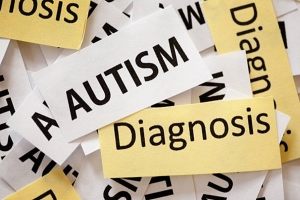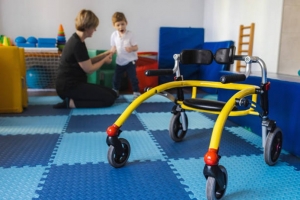Test Owner
A major review of medical records suggests that autism is now being identified earlier in young children, particularly boys, though many girls continue to face significant delays in receiving a diagnosis. The analysis, carried out by Epic Research using data from over 338,000 patients diagnosed between 2015 and 2024, found the median age of diagnosis for boys dropped from seven to five, with nearly half identified before the age of five last year.
For girls, the pattern was starkly different. The median age of diagnosis has remained around eight, with only a third diagnosed before the age of five. One in four women were not diagnosed until adulthood, compared with around one in eight men. Experts say the difference may be due to girls displaying subtler or less recognised signs, particularly when symptoms are mild.
While the median age for children has improved overall, the average age of diagnosis remains around 10.5 years, reflecting the number of people who are not identified until much later in life. Early detection is considered crucial, as interventions, therapies, and school support are most effective in the early years.
Specialists urge families to seek assessments through schools or state-run early intervention schemes, and to use trusted resources such as the NHS, the National Autistic Society, and other reputable organisations for guidance and support.
New research from the University of Southampton and the Netherlands Institute of Neuroscience suggests a strong connection between insomnia and reduced quality of life in adults with attention deficit hyperactivity disorder (ADHD). Published in BMJ Mental Health, the study revealed that at least one in four adults with ADHD report a sleep disorder, with insomnia being the most prevalent.
The findings come from the Netherlands Sleep Registry, an online survey involving over 10,000 adults. Participants completed a range of assessments covering demographics, ADHD symptoms, mental health, life satisfaction, insomnia severity, sleep quality, and preferred sleep patterns. Results showed that ADHD traits were linked to poorer life satisfaction, more severe insomnia, increased depression, lower sleep quality, and a tendency to go to bed and wake up later.
Analysis indicated that insomnia may be the key factor connecting ADHD symptoms with reduced life satisfaction. Senior author Dr Sarah L. Chellappa explained that sleep problems can affect attention, emotional control, and behaviour — while ADHD-related hyperactivity and impulsivity can, in turn, disrupt sleep, creating a cycle that worsens both issues.
Co-author Professor Samuele Cortese emphasised the need for further research to understand this complex relationship. He suggested that treatments targeting insomnia, such as Cognitive Behavioural Therapy for Insomnia (CBT-I) or Sleep Restriction Therapy, may improve both mood and overall quality of life for adults with ADHD.
Primark is set to introduce seated mannequins in 22 of its stores, designed to reflect manual wheelchair users and promote greater inclusivity on the high street. The mannequin, named ‘Sophie’, was developed in collaboration with disability campaigner and TV presenter Sophie Morgan, who played a central role in the year-long design process.
‘Sophie’ will feature in both the retailer’s new Adaptive clothing line and its mainstream fashion displays. The Adaptive range, launched earlier this year, includes thoughtful design features like magnetic fastenings, elastic loops and hidden openings for medical access—tailored for people with disabilities or mobility challenges.
This latest step is part of Primark’s broader commitment to better represent the diverse communities who shop with them. Trading Director Ann-Marie Cregan described the launch as a “proud moment”, highlighting the company’s efforts to make stores more accessible and inclusive—from mannequin variety to inclusive product design.
Sophie Morgan praised the partnership, calling the mannequin a “symbol of visibility and progress”. She emphasised how the project was deeply personal and reflected the realities of life as a wheelchair user. The announcement follows other inclusive changes from the brand, including improvements to children's clothing with comfort-led features for sensory-sensitive individuals.
A fresh national approach has been introduced to integrate adult social care placements into undergraduate nursing courses, with the aim of inspiring more students to explore careers supporting individuals with complex health needs, such as dementia, learning disabilities, or mental health conditions.
Currently, nursing students have limited exposure to social care settings, but this is set to change under the government's broader ambition to move care closer to home. By offering placements in residential care, supported living, and domiciliary settings, the initiative hopes to give students meaningful insight into preventative care and reduce unnecessary hospital admissions.
Minister for Care Stephen Kinnock highlighted that while social care nursing is both vital and rewarding, it remains underrepresented in training pathways. The new strategy, developed in partnership with Skills for Care and the Council of Deans for Health, sets out clear expectations for universities and care providers to co-create practical, course-aligned placements for students.
Students will now gain hands-on experience supporting patients in their own communities - working with assistive technology, supporting families, and delivering early intervention services. Chief Nurse for Adult Social Care, Deborah Sturdy, praised the initiative, calling it a significant step towards opening students’ eyes to the full scope of nursing. In 2025 so far, around 30,000 people have applied to study nursing.
The Local Government and Social Care Ombudsman has issued a reminder to councils that Education, Health and Care Plans (EHCPs) must be reviewed during key stage transitions, even if a child remains at the same school. This clarification comes amid a continued rise in upheld complaints about SEND provision, with nearly all investigated cases revealing faults.
The advice follows a case involving Warwickshire County Council, which failed to update a child's EHCP before the move from primary to secondary education. The council wrongly believed that, because the child was not moving school, it was not bound by the 15 February statutory deadline. The Ombudsman ruled that this was incorrect and that the obligation to review applies at the point of phase transfer, regardless of whether a school change occurs.
Ombudsman Amerdeep Somal highlighted that decisions about school placement should not be made until after a full EHCP review, in line with legal requirements. She urged councils nationwide to review their procedures to ensure compliance with statutory timelines.
As a result of the complaint, Warwickshire has agreed to apologise, pay £300 in compensation for the distress caused, and issue updated internal guidance. The Ombudsman continues to use such cases to promote better practice across public and social care services.
A newly established All-Party Parliamentary Group (APPG) is calling for evidence to explore the challenges faced by disabled individuals in obtaining essential medical equipment. Launched today, the inquiry is open for four weeks and seeks input from healthcare professionals, suppliers, disabled people, and their families to better understand the issues surrounding delays and accessibility.
Formed in May 2025, the APPG on Access to Disability Equipment aims to shape future policy that ensures timely and fair provision. It provides a platform for parliamentarians to collaborate with those directly affected, including carers, charities, and manufacturers. The focus is on how improved access to specialist equipment can enhance quality of life, independence, and overall wellbeing.
Many families report delays in receiving equipment due to workforce shortages, inconsistent local provision, and fragmented funding systems. These obstacles are compounded by under-resourced services and lack of coordinated planning, leaving individuals waiting for life-changing items that support daily living.
Stephen Morgan of children’s disability charity Newlife said recent budget cuts have made access harder, with only 40% of families receiving all the equipment they need. APPG Chair Daniel Francis MP stressed the need for a system that works swiftly and fairly, adding that the inquiry is a vital step towards understanding – and fixing – the barriers so many people currently face.
A new report has revealed that the majority of people with learning disabilities are navigating the digital world with little or no support, leaving them exposed to risks and barriers to access. Research from Cyber Champions, part of the Digital Care Hub’s Better Security, Better Care programme, found that 85% of adults with learning disabilities don’t receive regular help with using the internet.
Although most participants said the internet plays a positive role in their lives—particularly for staying in touch with friends and enjoying entertainment—many struggle with digital confidence. While 94% reported being online, further insight suggested that those who claimed disinterest often lacked the knowledge or confidence, not the desire, to engage digitally.
Alarmingly, many overestimated their cyber safety skills. Over half felt confident using online services, but only a third felt equally confident staying safe. Just 31% could recognise scam emails, and fewer than one in three knew how to adjust privacy settings. Many carers also lacked proper digital safety training, leaving those they support even more vulnerable.
The report outlines five key recommendations, including accessible cyber safety materials, relevant training for carers, and better support for unpaid family members. With the right guidance, people with learning disabilities can engage with technology safely and independently, just like anyone else.
Newly updated guidance from the British Psychological Society and the Royal College of Psychiatrists is set to improve the way dementia is identified and supported in individuals with learning disabilities. The publication offers a refreshed framework to help professionals in both clinical and social care settings deliver more tailored and effective support for this often-overlooked group.
Designed for use by clinicians in learning disability services, mental health teams for older adults, and dementia services for younger people, the guidance outlines best practices in assessment, diagnosis, and ongoing care. It’s also intended to help local authorities and health providers map out clear care pathways, ensuring consistent and informed support across all regions.
While public awareness of dementia has grown significantly in recent years, the needs of people with intellectual disabilities remain largely underrepresented in national dementia strategies. This third edition builds on the 2015 version, reflecting updated knowledge and refining areas of practice to align with current standards.
The revised document encourages services to benchmark their practices against defined quality standards and prioritises person-centred outcomes. Ultimately, the goal is to ensure fewer individuals fall through the gaps in care and to drive the development of more joined-up, accessible, and compassionate local support services for people with learning disabilities facing dementia.
Local councils across England overspent by £774 million on adult social care last year, the highest overspend in a decade, according to new figures from the Association of Directors of Adult Social Services (ADASS). Pressures to meet legal duties have forced councils to divert funding away from early intervention and preventative care, cutting this part of the budget by over 10%.
Despite government ambitions to move health and care services closer to communities, social care leaders warn this goal is unattainable without proper investment. The growing complexity of care needs, alongside rising costs, has left councils focusing solely on crisis support. With tighter eligibility criteria expected, fewer people are likely to receive help before reaching breaking point.
Care providers and campaigners say this reactive approach puts extra pressure on the NHS and leaves vulnerable people at greater risk. Ongoing issues include a postcode lottery for Continuing Healthcare funding and care staff being asked to carry out NHS duties without additional funding. All social care directors surveyed said they expect NHS pressures to increase demand on their services in the coming year.
Sector leaders are calling for urgent funding reform, warning that without long-term investment in community-based care, the government’s prevention-focused vision for health and social care cannot be realised.
A growing grassroots campaign is warning that the government’s Access to Work scheme, which supports disabled people in employment, is now in serious jeopardy. The Access to Work Collective – a group of over 3,000 disabled individuals and allies – has launched the #AccessToNowhere campaign in response to mounting concerns about delays, funding reductions and mismanagement since early 2024.
Launched in 1994, the scheme provides practical help like specialist equipment, transport support, BSL interpreters and workplace assistants, allowing disabled employees to access and stay in work. It also eases pressure on employers by covering costs that might otherwise deter inclusive hiring. Despite its proven benefits, many now face award cuts of up to 60% and months-long delays in both new applications and renewals.
Campaigners say the system is now overwhelmed, with 62,000 applications still awaiting decisions and a backlog of 33,000 unpaid claims. Behind these statistics are real people – some who have already lost their jobs, and others struggling to stay in work without the support they’ve been promised.
Public figures like Rose Ayling-Ellis and Adam Pearson have condemned the cuts. They argue the scheme’s collapse risks pushing thousands of disabled people out of employment, calling it a failure of leadership and a step backwards for disability rights in the UK.












